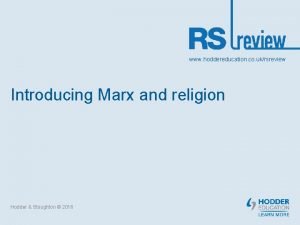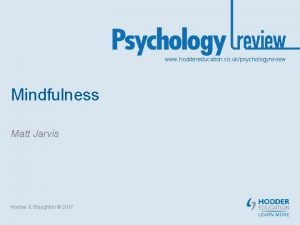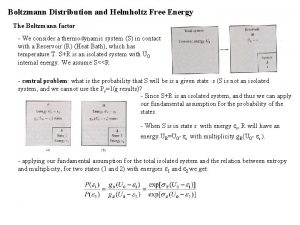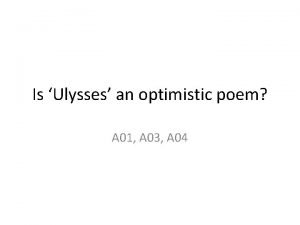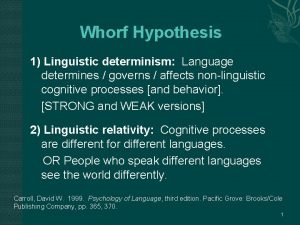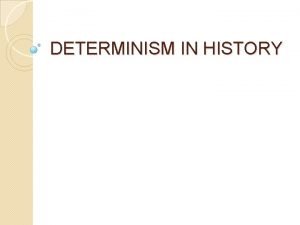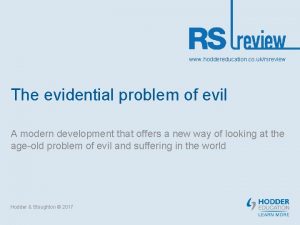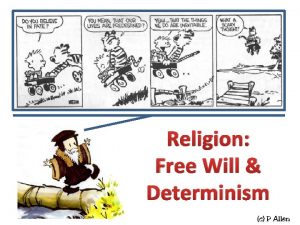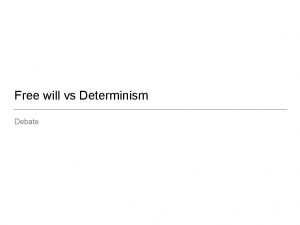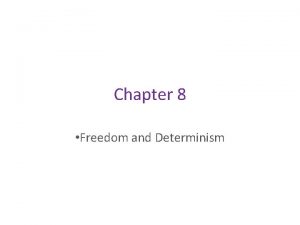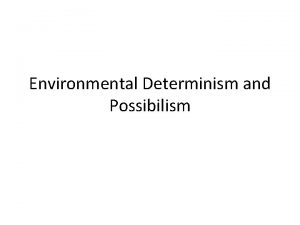www hoddereducation co ukrsreview Free will and determinism










- Slides: 10

www. hoddereducation. co. uk/rsreview Free will and determinism The self in the modern mind Hodder & Stoughton © 2016

The self in the modern mind Free will • Spontaneous will, unconstrained choice (to do or act). Often in phrases ‘of one’s own free will’, and the like, ‘in one’s free will’: left to or depending upon one’s choice or election. • The power of directing our own actions without constraint by necessity or fate. People often say things such as: • ‘I have free will so I can choose what I do’ • ‘I did it of my own free will’ • Are either of these statements really true? Are we completely free to choose what we do? • Most people would probably agree that we can only be held morally responsible for our actions when we choose them freely. • However, there are several different views about this. Hodder & Stoughton © 2016

Determinism (1) • This view is that the laws of nature actually govern everything that happens and that our actions are, in fact, the result of these scientific laws. • From this viewpoint every ‘choice’ that we make is determined by whatever situation immediately preceded it. • This chain stretches backwards and forwards, effectively to infinity. • The idea that we actually always have freedom of choice is just an illusion. If this is true then the concept of personal responsibility is meaningless, and likewise we cannot justly exercise blame and punishment for people’s acts. • In this case the idea that people should be held morally responsible for actions they carry out freely makes no sense. • This does not mean that an individual may not feel morally responsible for an act they have carried out. Hodder & Stoughton © 2016

Determinism (2) • St Paul taught that God chose who would be saved because nobody deserves salvation. He argued that freedom was being freed by the laws of the Old Testament. They had the ability to choose to worship God and accept salvation through Jesus. • St Augustine (354– 430) argued that human will is completely corrupt because of the Fall and that people cannot perform a good action without the grace of God. He believed that only those chosen and elected by God can be saved. God knows what everyone will choose. • Augustine described three types of events: • • those caused by chance; • those caused by God; • those that people cause themselves. Both of these ideas are similar to those of soft determinism, as they show the difference between the internal and external causes. Hodder & Stoughton © 2016

Determinism (3) • Pelagius (354– 420) rejected all deterministic ideas. He stressed human autonomy and free will. • John Calvin (1509– 1564) was influenced by Paul and Augustine. He believed that Paul was teaching predestination and that human beings have a limited understanding of God’s plans. • Calvin taught that humans were complete sinners, incapable of coming to God. Therefore, predestination must happen or nobody could be saved. Humans cannot do anything to achieve their own salvation and must rely on God. According to Calvin, people are not all created with a similar destiny: • ‘Eternal life is fore-ordained for some, and eternal damnation for others. Every man, therefore, being created for one or the other of these ends, we say, he is predestined to life or death’ (Institutes of the Christian Religion, 3: 21: 5) • People do good because God made them that way and put them in a particular environment. Others are limited by their nature and can only choose to sin. Hodder & Stoughton © 2016

Hard determinism (1) • Hard determinists hold a strict position and argue that, as all our actions had prior causes, we are not free or responsible; we cannot act in any other way. Humans are like a machine, and if something goes wrong it needs to be fixed. • An individual cannot be blamed for being violent. Either this violence needs to be fixed or they need to be put into prison. • John Hospers (1918– 2011) was a modern hard determinist and in his article What Means This Freedom he rejects the absence or presence of premeditation as a factor for determining moral responsibility for one’s action. He suggests that a person is not morally responsible for their action if it is ‘the result of unconscious forces’. He argues that no responsibility can be placed on a person who is acting under compulsion from one of these forces: • external forces • unconscious causes • the inevitable consequences of infantile situations • He continues by saying that the early parental environment is the most significant influence. Hodder & Stoughton © 2016

Hard determinism (2) • Clarence Darrow (1857– 1938) was an American lawyer. His most famous case was when he defended two young men, Nathan Leopold and Richard Loeb, who were charged with the murder of a young boy. This was intended to be the perfect crime but it ended up in court. Darrow, who was totally opposed to capital punishment, argued successfully that the death penalty should be commuted to life imprisonment on the grounds that the men were the product of their upbringing and the wealthy family environments in which they lived. • • ‘What has this boy to do with it? He was not his own father; he was not his own mother; he was not his own grandparents. All of this was handed to him. He did not surround himself with governesses and wealth. He did not make himself. And yet he is to be compelled to pay’ (Darrow C. in Philosophical Explorations: Freedom, God, and Goodness, S. Cahn (ed. ), 1989) ‘Punishment as punishment is not admissible unless the offender has the free will to select his course. ’ (Darrow) Hodder & Stoughton © 2016

Hard determinism (3) • John B. Watson (1878– 1958) argued that it is possible to predict and control behaviour. He said that behaviour is influenced by both nature and nurture. If people’s environment is manipulated, then behaviour can also be altered. He called this ‘conditioning’. • Steven Pinker (1954–) looks at ideas from Darwin, more recently promulgated by Richard Dawkins (1941–). He argues that the emotions of anger, guilt, love and sympathy have their basis in biology. His theory is that our moral reasoning is a result of natural selection. However, he does not accept that this means the end of moral responsibility. We have an innate moral sense ‘as real for us as if it were decreed by the Almighty or written into the cosmos’ (Pinker, S. The Blank Slate: The Modern Denial of Human Nature, 2003). Hodder & Stoughton © 2016

Hard determinism (4) • Determinism is influenced by the physics of Isaac Newton: the universe is governed by immutable laws of nature such as motion and gravitation. Pierre. Simon Laplace (1749– 1827) believed that if the causal factors could be understood all actions could be predicted so that, in fact, there is neither chance nor choice. • So, according to hard determinism we do not have free choice, we merely think that we do. This view is echoed by Paul-Henri Thiry (Baron) d’Holbach (1723– 1789) who argued that all humans and society could be understood as cause and effect. Hodder & Stoughton © 2016

Hard determinism (5) • Ted Honderich (1933–) writes that everything is physically determined so that there is no choice and no personal responsibility. There is no room for moral blame and no point in punishment for the sake of punishment. • Honderich identifies three responses to determinism: dismay, intransigence and affirmation. • ‘Dismay is a response to determinism that may have to do with life-hopes, claims or feelings of knowledge, personal feelings, moral approval and disapproval and so on. Dismay is the response that if determinism is true, these things are wrecked. My lifehopes must collapse, and so on…’ • ‘Intransigence is the response that if determinism is true I can still soldier on — with my life-hopes, personal feelings and so on…’ • ‘Affirmation can be the response that life can be great and fulfilling. As for the giving up on the other desires, the best way to succeed in it is to come to believe in determinism. ’ (Interview in Issue 6 of The Philosophers’ Magazine, spring 1999) Hodder & Stoughton © 2016
 Www hoddereducation com
Www hoddereducation com Positive feedback geography
Positive feedback geography Ansoff matrix dyson
Ansoff matrix dyson Www hoddereducation com
Www hoddereducation com Www.hoddereducation.co.uk
Www.hoddereducation.co.uk Free will and determinism evaluation
Free will and determinism evaluation Examples of possibilism
Examples of possibilism Helmholtz free energy and gibbs free energy
Helmholtz free energy and gibbs free energy Summary of the story of an hour
Summary of the story of an hour Happy isles ulysses
Happy isles ulysses Definition of linguistic determinism
Definition of linguistic determinism



